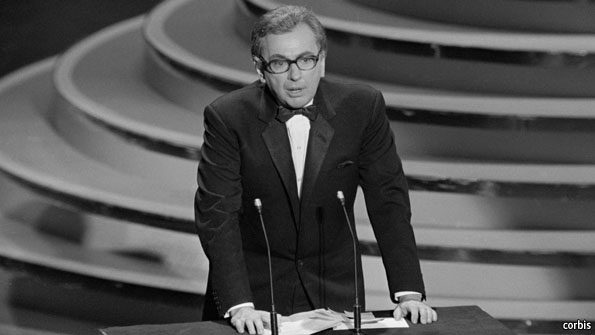Re Ian Bremmer 'Could third-party candidates upend the 2024 US election?' 3 April The current political movement in the USA…
Gore Vidal R.I.P.
Written by Diana Thebaud Nicholson // August 4, 2012 // Arts and culture // Comments Off on Gore Vidal R.I.P.

Gore Vidal Dead: American Intellectual, Author And Playwright Dies At 86
In a world more to his liking, Gore Vidal might have been president, or even king. He had an aristocrat’s bearing – tall, handsome and composed – and an authoritative baritone ideal for summoning an aide or courtier.
But Vidal made his living – a very good living – from challenging power, not holding it. He was wealthy and famous and committed to exposing a system often led by men he knew firsthand. During the days of Franklin Roosevelt, one of the few leaders whom Vidal admired, he might have been called a “traitor to his class.” The real traitors, Vidal would respond, were the upholders of his class.
The author, playwright, politician and commentator whose vast and sharpened range of published works and public remarks were stamped by his immodest wit and unconventional wisdom, died Tuesday at age 86 in Los Angeles.
Gore Vidal (1925-2012): He Did It His Way (And Loved Every Minute)
(HuffPost) Vidal had no self-doubt. He used his legendary intellect in the service of opinions that drew blood. Feuds thrilled him. And he never lost the swagger that comes from knowing that — at least in his youth — he was a stunner.
Want a guided tour? Pass an enjoyable few hours with Snapshots in History’s Gaze, a late-life picture-and-text romp. … Put this book on your coffee table, and it will soon fight with the other books there. He’d be thrilled.
Gore Vidal quotes: 26 of the best
Gore Vidal, the celebrated writer, has died aged 86. He was famous for his acerbic wit. Here are some of his best quotes
Our personal favorites: “The United States was founded by the brightest people in the country — and we haven’t seen them since.” and
“Fifty percent of people won’t vote, and fifty percent don’t read newspapers. I hope it’s the same fifty percent.”
Remembering Gore Vidal
A dying breed
(The Economist | Prospero) It is hard to imagine men like Vidal and Buckley, two snobbish East Coast intellectuals with lockjaw patrician accents, being invited onto prime-time television now to opine on the hot-button issues of the day. Vidal’s death earlier this week, at age 86, marks not only the loss of a provocative novelist and political thinker, but also the demise of a brand of public discourse. It seems there is no longer a place for the erudite and witty public intellectual in America. Instead of learned allusions to classical literature, public figures, including the president of the United States, are now expected to drop their g’s and speak knowledgeably about the cast of “The Jersey Shore.”
In part, this is a product of progress. The club of elite public intellectuals we have lost in the last decade—Vidal, Buckley, Christopher Hitchens and Norman Mailer, to name a few—was decidedly male, largely white and upper-class, drawing its members from a few old-line private colleges and prep schools. As higher education extends beyond a narrow, moneyed elite, mass audiences increasingly want experts who look and sound like idealised versions of themselves. So we get “Joe the Plumber” lecturing Barack Obama on socialism, and Irish pop stars lecturing heads of state on humanitarian relief in Africa. Even card-carrying members of the elite, such as former President George W. Bush, are keen to play down their Ivy League educations and play up their love of clearing brush on the ranch. Punditry reflects the diversity of every other sphere of public life, and few need fear being called “queer” on national television.
But although we hear from a far broader spectrum of voices, the end of the era of unabashedly elite public intellectuals coincides with a loss of a certain unironic seriousness in popular culture. The 1968 confrontation between Vidal and Buckley is famous today because of the way the two men sniped at each other, but before they descended into personal insults, the two men were engaged in a nuanced debate of constitutional principles. Buckley argued that Chicago’s police could be forgiven for trying to silence protesters whose complaints might comfort America’s enemies in Vietnam; Vidal countered that political dissent, no matter how provocative, is protected under the First Amendment.
The angry confrontation between these two men is remembered today largely because such outbursts were so rare, so embarrassing. But now, when much political debate is designed to be entertainingly diverting, the name-calling would have been the whole point. With Gore Vidal’s death, the world of letters has lost a valuable voice. And we have all lost yet another member of a generation of public figures that was willing, without apology or ironic deflection, to take serious matters seriously.
Not everyone was an admirer
John Ibbitson: Gore Vidal lived too long
(Globe & Mail) Getting over Gore Vidal was an important life lesson for many of us. It took a while to realize that seeing America through his eyes required the capacity to hate. He was capable of hate; few others are.
Instead, the world briefly notes his passing, discounting the anger, remembering that he was from such a different world and such a distant past. His death reminds us of how sad a life can be that extends too far beyond its time. He lived too long.
… Not that his death isn’t a loss, even if it came after he had long since been outside his time. (He had declared Mr. Capote’s death to be “a wise career move.”) The world is a grubbier place now than it was when Mr. Vidal was a great man. Politics and prose today are as casually savage as he ever was, but with none of his elan. Gore Vidal has been replaced by Jon Stewart.
The class he came from has been replaced by a new set with new money and new, and much cruder, ideas.
Worst of all, the tributes over the past few days have been mostly affectionate. He would have hated that. Worship him or punch him (as Norman Mailer once did. He responded: “Words fail Norman, again”), but don’t treat him like a loveable but increasingly cranky old uncle finally going to his reward.
Stop Eulogizing Gore Vidal
He was a racist and an elitist, forever mourning the decline of his era of aristocratic privilege.
By David Greenberg
(Slate) Toward the end of Vidal’s life, he discredited himself even on the left with his embrace of loony ultra-right causes, such as Ruby Ridge, Waco, and eventually Timothy McVeigh, who blew up the Oklahoma City Murrah building in 1995. Vidal feebly tried to justify these indefensible sympathies by pointing to the United States government’s abuses of power. McVeigh, moreover, was not unique in soliciting Vidal’s tender mercies. The Sage of Ravello was an equal-opportunity apologist for terrorists, taking up the obscene theories (which, in an exquisite Orwellism, go by the name “truther”) that the Bush administration was complicit in al-Qaida’s 2001 attacks on the Twin Towers and the Pentagon. Unfortunately, this delusion was excused in some quarters as eccentricity, the confusions of advancing age, or forgivable derangement brought about by the misdeeds of American politicians and policymakers which, one was perhaps supposed to infer, embodied the more proper targets of our censure.

